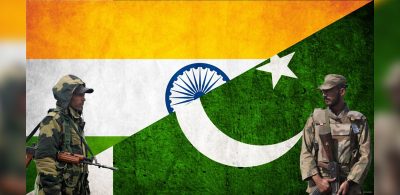India and Pakistan Increase Mutual Violence Amidst Pandemic

In the midst of the global pandemic, India and Pakistan are increasing mutual violence, without due attention being paid to the situation by the international media. Several violations of the ceasefire between the two countries have been taking place in recent weeks, reigniting the flame of a regional war that troubled the world last year, when relations between India and Pakistan approached the total catastrophe in Kashmir.
In April, India violated Pakistani airspace by sending a military spy drone to capture images of Pakistani territory along the Line of Control. The drone is estimated to have crossed more than 600 meters of the Pakistani airspace. In an official note, the Pakistani Army stated that the act was a true provocation and that it obtained an incisive and effective response: “This blatant act was answered harshly by the Pakistani Army troops, who shot down the Indian drone. This act of the Indian Army is a clear violation of the rules established between the two countries and has demonstrated the Indian Army’s lack of commitment to the 2003 ceasefire”.
Previously, Pakistan reportedly summoned an Indian diplomat to express protest against violations of the ceasefire agreement signed in 2003, but apparently has had no success in the negotiations. Last year, another Indian drone was also shot down after entering 150 meters into Pakistani territory, according to the Pakistani Armed Forces.
However, the Indian Army also claims to have its grounds for tightening up the surveillance system. According to a response by the country’s security forces, the reason for sending the drone was the recent detection of a large Pakistani infiltration into Indian territory. In a recent Pakistani military operation around the Line of Control, five Indian soldiers were killed, undermining collective security and exacerbating local tensions. India responded sharply to the attack, firing missiles at Pakistani platforms and deposits in the regions of Jammu and Kashmir. According to the Pakistani government, these platforms were used by terrorist groups and have been completely destroyed.
According to a recent study by the National Academy of Sciences of the United States of America, led by Jonas Jagermeyr, a low-level nuclear conflict between India and Pakistan could wipe out large areas of the world’s food supply, starting cataclysmic fires that would extinguish the sun in a decade-long nuclear winter. In an approximate estimate of 150 nuclear warheads for each country, Pakistan and India pose a real threat to global food security with their arsenals, if they eventually use them. Although it is a small nuclear stockpile, representing an insignificant fraction of the world’s 14,000 warheads, the nuclear power of these countries can be devastating, even in a “limited war”, which raises the need to seek a reconciliation dialogue and to try to ease tensions.
The study is carried out by starting a simulation in 2025, when tensions in the region turn into a hypothetical shooting war, and then supposes what might happen if both sides detonate a total of 100 bombs with the size of the Hiroshima one – much less powerful than many modern warheads. In addition to the immediate death and destruction of the explosions, a cascade of side effects would agitate the world’s climate for years, according to the study, causing immense fires that would send more than 5 million tons of soot into the stratosphere. With a layer of smoke, global temperatures drop sharply, sending crop yields into a steady downward spiral, “overcoming the greatest famine ever recorded”, creating an almost apocalyptic world scenario.
It is for these reasons that Russia recently warned that the accession of India and Pakistan to the Treaty on the Non-Proliferation of Nuclear Weapons would be a real disaster, an extremely dangerous idea, given that both countries have been involved in an endless conflict for decades that pushes them to an eternal arms race that aims to define who is the superior power. This situation of conflict and dispute could represent the definitive end of the agreement and its complete failure, instead of limiting the arsenals of India and Pakistan, so that it may be safer to keep them out.
A possible war between India and Pakistan would not benefit anyone. Both are extremely strong countries, with enormous growth potential and which can only lose with a conflict of such magnitude. The image of both countries is diminished by the war, being rejected from international agreements and projects with other world powers due to the insecurity generated by their presence. It is more than obvious that the real way to resolve the territorial disputes between them is not war, but dialogue and arbitration.
A formal and definitive agreement could extinguish or at least soften and postpone the disputes between Pakistan and India, however, it is clear that countries with such a history of rivalry have great difficulty in dialogue. For this reason, it is lucid to defend international arbitration mediated by another emerging power, such as Russia or China, which aims at a balance point and a fertile and lasting agreement, from which India and Pakistan can develop peacefully and improve their relations between themselves and with other countries.
*
Note to readers: please click the share buttons above or below. Forward this article to your email lists. Crosspost on your blog site, internet forums. etc.
This article was originally published on InfoBrics.
Lucas Leiroz is a research fellow in international law at the Federal University of Rio de Janeiro.
Featured image is from InfoBrics

